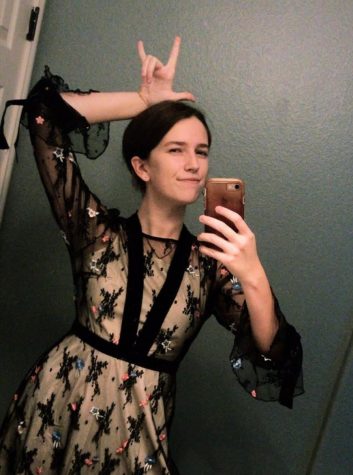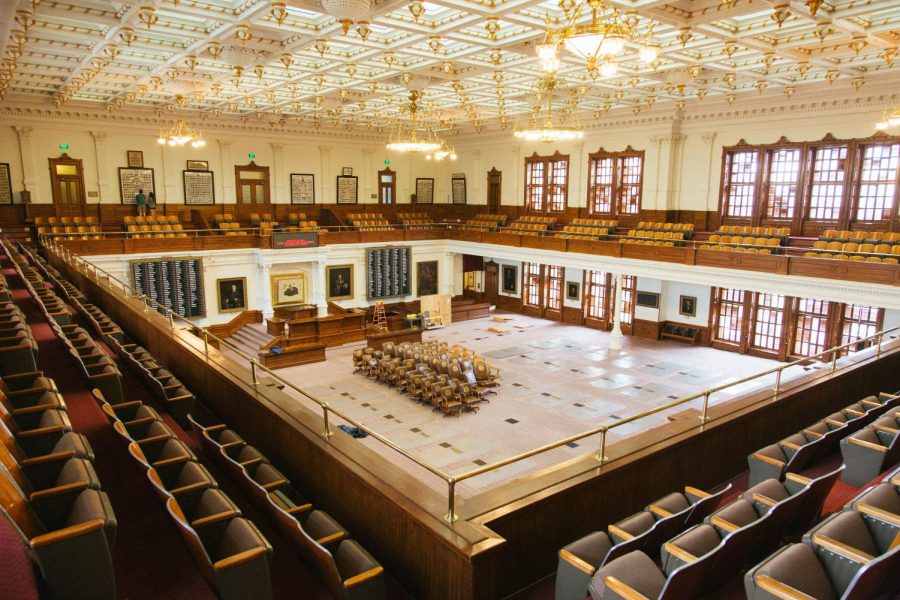Youth and Advocacy – Kaileigh Dilks
She leaves the debate room, pushing up her glasses and fixing her coat. Her sighs are that of exhaustion and satisfaction, as the excitement of the meet comes to a close. She recalls the events of the past few hours: the bill brought to the floor, the pro and opponent speeches, the flurry of emotion that settles around the rights of those in America.
Her interest in government, advocating for human rights, and showing that people should feel empowered to express their emotions is what motivates senior Kaileigh Dilks with her journey in Texas Youth and Government and Speech and Debate.
“I think it’s really important that when we look at politics, when we look at government, and when we even just look at speech and debate at your school, it’s very important to think outside of your own needs,” Dilks said. “Think about what other people need, not just about yourself. Because when you think selfishly, and you only think about what benefits you, then you’re leaving out a massive part of the population.”
In 2016, Dilks lived in Springfield, Virginia, where she experienced a heavily political environment being close to Washington D.C. Here, Dilks saw people from diverse backgrounds and living conditions, such as low income housing and many immigrant families. Dilks saw many friends and their families affected by hardships such as police brutality and changes with the Trump administration.
“It made me really angry and it made me want to do what I can to advocate for justice reform and help bring an end to it [police brutality],” Dilks said. “I think for a lot of people it’s very easy to distance yourself and pretend like it doesn’t happen when you haven’t seen how it affects the people around you, but we as a society can’t go on living in a bubble.”
Finding her interests spiked more after taking a civics economic class her eighth grade year. Dilks came to Rouse and joined Speech and Debate her freshman year. Finding to love her teammates and the environment of the class, Dilks chose to stay, and currently does congressional debate.
“I definitely feel like I’ve gotten a better sense of, first of all, speaking impromptu, speaking off the top of your head,” Dilks said. “I’ve definitely noticed that I have been able to be with just a lot of people with different opinions, to be able to lay out my feelings and the things that I know about a situation a lot better, to be able to structure an argument a lot better, and it’s also made me a much more confident speaker publically.”
After participating in speech and debate for two years, she found to love congressional debate, but wanted to find another outlet for her interest in government. In her junior year, she found that outlet. Through her English teacher, Mr. Manning, Dilks discovered a new club at Rouse, YMCA Texas Youth and Government in the Legislative branch, a club that hosts competitions for bill writing, passing and debate.
“After he told us about that I was immediately interested, and since it’s done through the YMCA a lot of times they have grants so I didn’t have to worry about being able to afford to go to competitions,” Dilks said. “I’ve already gained a lot of things from Youth and Government, I know our Youth and Government group is actually pretty friendly and pretty close.”
Dilks has found ways to take to activism, such as opening up discussions with her friends and family. With being in Speech and Debate and Youth and Government, Dilks has found more doors to open for activism.
“One of the main things I like to do is make sure other people that I know are informed and I like to participate in government in the ways that I can,” Dilks said. “I also like to let the students I know, students that I go to school with, I like to let them know that there are outlets for them to be politically active and for them to come face to face with their representatives through things like Speech and Debate and Youth and Government.”
Youth and Government has allowed Dilks to find a better understanding of the complexity of writing, passing, and debating that comes with proposing a bill in Congress. Dilks has realized that there are people writing bills or arguing bills that may or may not be informed about certain topics but are willing to make laws about them.
“It just gives you this very clear understanding of how varied the opinions are of your representatives, and also how uninformed some of your representatives are going to be because you don’t have to have any other requirements other than an age requirement to be a representative. It’s basically the same for Youth and Government,” Dilks said.
The environment of the competitions and the topics discussed for Youth and Government and Speech and Debate can factor into different outcomes that Dilks faces following each competition.
“It really does depend on the environment. Sometimes you come out and you’re just exhausted from talking for so long, other times you’re really, really hyped up because you know you just made a great speech or you had a wonderful conversation with your considuants,” Dilks said. “And then other times you come out and you’re just angry, or sad, or disappointed because you’ve really seen how people think and you start to understand more people’s mindsets, and it might be disappointing for you. Or it might be disappointing that you lost or you don’t get to finals like you wanted to.”
With the presidential election coming up on November 3, Dilks has found personal concerns for rights of those such as the LGBTQ+ community and the DACA (Deferred Action for Childhood Arrivals) program being dissolved.
“Some of my main concerns are a lot of the rhetoric going on right now,” Dilks said. “I have many feelings about the election.. I think most people do, but I think one thing that we should all take away from this is that people’s voices, people’s individual voices, are important, even when it feels like they aren’t.”
Following high school, Dilks would like to continue advocating for people and human rights, and while there’s the possibility of getting involved in politics later on, she wants to empower young people by becoming a teacher.
“We’ve already seen a massive uprising in youth culture about speaking out against the government, about expressing their feelings, and I think that’s something we really need to empower newer students to do,” Dilks said. “Mostly I just want to learn about other people and what they’ve gone through. I also like to have a better understanding of how the majority of people can get directly involved in government without being a politician.”




